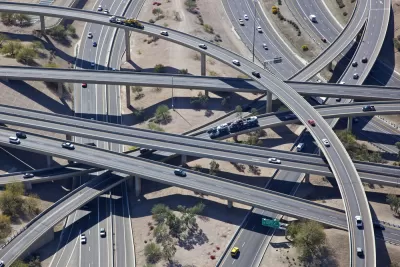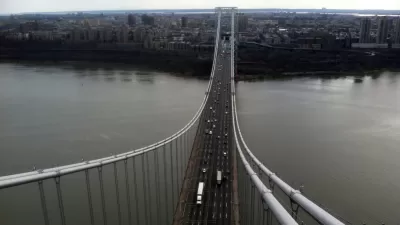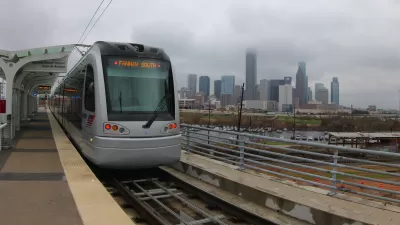An agreement laid out last week by the White House and Republican lawmakers makes dramatic cuts to funding for public transit, rail, and "human infrastructure" projects while leaving highway funding almost intact.

Last week, President Biden and congressional leaders announced their agreement on the Bipartisan Infrastructure Framework, a compromise that retains some of the programs proposed in the American Jobs Plan while also appealing to a sufficient number of Republican lawmakers. The Framework proposes $579 billion in new spending, largely directed to road, bridge, and highway projects. It also slashes the proposed budget for many of the American Jobs Act's social and climate change-related programs, completely eliminating funding for much of what President Biden called "human infrastructure," such as housing, schools, and childcare, and dramatically cutting spending on public transit, rail, electric vehicles, and clean water infrastructure.
While the White House calls the proposal "the largest long-term investment in our infrastructure and competitiveness in nearly a century," critics express disappointment with the drastic reduction in spending on some programs. "Hard to believe these initiatives would be adequate to counter the devastating climate impacts" of the over $400 billion in road funding, says Yonah Freemark of the Urban Institute. Matt Yglesias argues that "there's just no reason to believe that the existing surface transportation funding levels in the United States are inadequate." Mitchell Bernard, president of the Natural Resources Defense Council (NRDC) calls the deal "a modest start toward fixing America’s crumbling infrastructure," calling for Congress to "finish the job by passing the American Jobs Plan, which will drive an equitable recovery with climate action and job creation in a moment we need all of them."
Although legislative language has yet to be finalized, the agreement published by the White House last week proposes $201 billion in water, sewer, power, and environmental remediation projects, $65 billion for broadband infrastructure, $47 billion for resilience projects meant to mitigate the growing effects of sea level rise and extreme weather, $49 billion for public transit, and $15 billion in spending on electric vehicle infrastructure (including President Biden's goal of building a network of 500,000 EV charging stations). According to Matthew Choi of Politico, "that's still less than the White House’s original $174 billion EV proposal, and several of progressives’ biggest climate asks were noticeably absent, including a clean energy standard or Civilian Climate Corps." The proposal also includes $66 billion for passenger and freight rail, $5 billion for the crucial issue of Western water storage, and $1 billion for what the bill calls "reconnecting communities," all significantly lower figures than proposed in the American Jobs Plan. The plan provides $109 billion for roads and bridges–this in addition to the $303.5 billion proposed by the Surface Transportation Reauthorization Act of 2021, introduced in May.
Funding for the proposed programs would come from a patchwork of sources such as enhanced IRS enforcement, the repurposing of unused COVID-19 relief funds, and a new Infrastructure Financing Authority, a federal agency designed to incentivize private investment. According to the White House's fact sheet, the Framework is also financed by "targeted corporate user fees, and the macroeconomic impact of infrastructure investment." A hike in the corporate tax rate, which is part of Biden's American Jobs Plan proposal, is conspicuously absent from the revised agreement. "In the pursuit of enough Republican votes to clear a Senate filibuster," writes Jim Tankersley in the New York Times, "the deal excludes all the president’s proposals to more heavily tax corporations and the rich, much of his push to curb climate change and all his proposed investments in the 'human infrastructure' of education, paid leave and child and elder care."
President Biden praised the compromise, saying "[i]t reflects consensus," but the President, House Speaker Pelosi, and Senate Majority leader Schumer vouched that to pass, the Framework would have to be accompanied by additional legislation that addresses Democrats' concerns. Yet the sweeping cuts made in the Framework leave many wondering whether the downsized programs will live up to the promises laid out in the American Jobs Plan.

Planetizen Federal Action Tracker
A weekly monitor of how Trump’s orders and actions are impacting planners and planning in America.

Congressman Proposes Bill to Rename DC Metro “Trump Train”
The Make Autorail Great Again Act would withhold federal funding to the system until the Washington Metropolitan Area Transit Authority (WMATA), rebrands as the Washington Metropolitan Authority for Greater Access (WMAGA).

The Simple Legislative Tool Transforming Vacant Downtowns
In California, Michigan and Georgia, an easy win is bringing dollars — and delight — back to city centers.

The States Losing Rural Delivery Rooms at an Alarming Pace
In some states, as few as 9% of rural hospitals still deliver babies. As a result, rising pre-term births, no adequate pre-term care and "harrowing" close calls are a growing reality.

The Small South Asian Republic Going all in on EVs
Thanks to one simple policy change less than five years ago, 65% of new cars in this Himalayan country are now electric.

DC Backpedals on Bike Lane Protection, Swaps Barriers for Paint
Citing aesthetic concerns, the city is removing the concrete barriers and flexposts that once separated Arizona Avenue cyclists from motor vehicles.
Urban Design for Planners 1: Software Tools
This six-course series explores essential urban design concepts using open source software and equips planners with the tools they need to participate fully in the urban design process.
Planning for Universal Design
Learn the tools for implementing Universal Design in planning regulations.
Smith Gee Studio
City of Charlotte
City of Camden Redevelopment Agency
City of Astoria
Transportation Research & Education Center (TREC) at Portland State University
US High Speed Rail Association
City of Camden Redevelopment Agency
Municipality of Princeton (NJ)






























